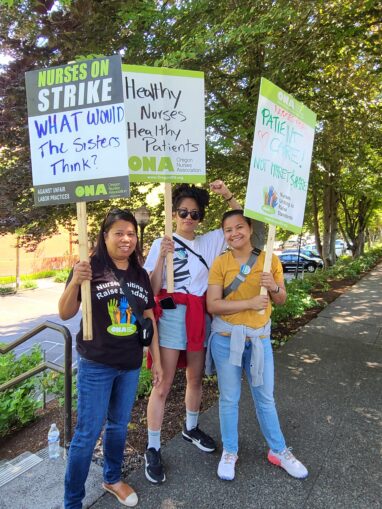ON STRIKE: 1,800 Portland Prudential nurses
Portland, Oregon
Nurses and clinicians marched off the job June 19 for a weeklong strike after an overwhelming 97% strike authorization vote from three Providence facilities: Providence Portland, Providence Seaside and Providence Home Health and Hospice. The nurses’ demands emphasize health care coverage, paid time off, wages and staffing levels.

Left to right: Josephine, a Filipina nurse, Angelica from BAYAN and Freddie from Migrante Portland. They were at the week of strikes to especially support Filipino nurses, who make up a large section of nurses particularly in Portland, Oregon. WW Photo: Lyn Neeley
At a strike rally June 22, a speaker from the Oregon Nurses Association (ONA) called for fewer millionaires and more nurses. She said since COVID-19 began, CEOs’ pay is up and staffing pay is down. “We want Providence to put patients and staff ahead of their own profits. This isn’t just about money and never has been. It’s about sick time and paid time off to care for ourselves and our families, ensuring safe staffing so our patients are properly cared for and making our careers sustainable.”
Two of the signs at the rally read, “Recruit, retain and respect,” and, “Heroes treated like zeroes.”
Nationally, over 100,000 nurses have left the workforce in the past two years. This is Portland’s first health care walkout in 22 years.
Josephine, a Filipina nurse, said, “Prudential doesn’t see the value of what we do. We have been devalued, especially during and since COVID. They can’t afford to give the wages we deserve, yet they are paying to put the scabs up at the Hyatt Hotel.” She added, “It has been so depressing. I have seen many colleagues crying and asking if they should claim PTSD.”
Portland nurses are fighting for staff safety standards for all Oregon nurses including minimum staff rotations, better, safer equipment and benefits comparable to their colleagues at other major medical centers in Portland. They are demanding more sick leave and paid time off (PTO) than Providence is offering.
PTO is a priority for most nurses, who are forced to use extended sick leave for short-term disability. They also want double pay for nurses who take extra shifts to help with short staffing, which would be cheaper for the hospital than paying for traveling nurses.
Supporters at the strike included large numbers of workers from Portland’s labor community and other community supporters. Support also came from the 16,000 members of ONA, 1,500 nurses in Eugene and 3,000 at Oregon Health and Sciences University.
Angelica from BAYAN, an alliance fighting for democracy and sovereignty in the Philippines, said she t the strike to support nurses, particularly Filipino nurses. She said: “There is a large number of Filipino nurses in the U.S. workforce, who have migrated here from the Philippines to escape Duterte’s horrific economic policies from the past.”
Richard from Providence Portland Medical Center told the rally: “It’s not running smoothly in [the hospital].” He said security has been harassing the scabs. “With nurses on the outside, there are problems on the inside.” He thanked the huge crowd of supporters for coming together to support the nurses and staff, saying, “Only this kind of solidarity in the streets can change things.”
Other signs read, “Oregon is Union Strong!’” and, “If you take on one of us, you take on all of us.” One speaker told the crowd they need to all come out and support the upcoming Teamsters UPS strike.
According to ONA, now that the week on strike is over, negotiations return to the table. The strikes showed Providence how much these issues matter to nurses, patients and the community. Management at Providence told the nurses and health care workers that if they went on strike, their next offer would be less lucrative. ONA’s response is, “We doubt that.” They said it was an empty threat meant only to intimidate the workers.

